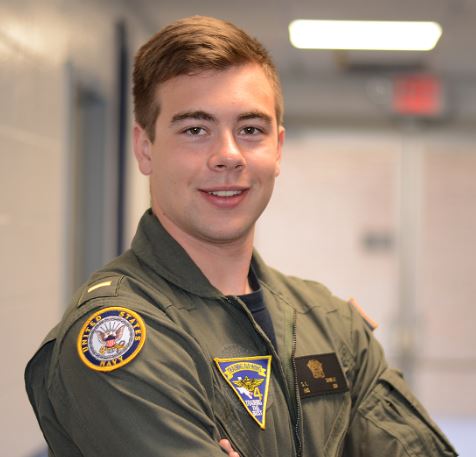
A 2014 East Coweta High School graduate and Newnan, Georgia, native supports the training of naval aviation personnel and air operations.
Ensign Samuel Siprelle is a student pilot serving with Training Air Wing 4 at Naval Air Station Corpus Christi, Texas. Training Air Wing 4 oversees Primary flight training in T-6B Texan II aircraft and Advanced multi-engine flight training in T-44C Pegasus aircraft at four squadrons on base.
Currently, Training Air Wing 4 produces approximately 600 newly qualified aviators each year.
A Navy student pilot is responsible for learning to fly aircraft of increasing capabilities and complexity for the fleet.
“My training prepares me to employ advanced naval aircraft in defense of our nation,” Siprelle said. “There’s a terrific degree of camaraderie amongst the student pilots. It’s a great experience to go through this process with such a tight-knit group of people.”
Siprelle credits success in the Navy to many of the lessons learned growing up in Newnan.
“Perseverance in the face of adversity served me well growing up and serves me well today as a student,” Siprelle said.
There are more than 40 tenant commands and activities located on NAS Corpus Christi. The Chief of Naval Air Training (CNATRA), headquartered here, oversees the training operation throughout the Southeast Region, from Texas to Florida. Under CNATRA’s command are five training air wings, 17 training squadrons, more than 14,000 Navy and civilian personnel, the Navy Flight Demonstration Squadron, the Blue Angels, the Naval Aviation Schools Command and the National Museum of Naval Aviation.
The air training program is approximately 18 months long and focuses on the increased complexity of today’s aircraft. Students must complete multiple phases of flight training in order to graduate, including aviation pre-flight indoctrination, primary flight training, and advanced flight training. After successfully completing the rigorous program, naval aviators earn their coveted “Wings of Gold.”
A key element of the Navy the nation needs is tied to the fact that America is a maritime nation, and that the nation’s prosperity is tied to the ability to operate freely on the world’s oceans. More than 70 percent of the Earth’s surface is covered by water; 80 percent of the world’s population lives close to a coast; and 90 percent of all global trade by volume travels by sea.
Siprelle plays an important role in America’s focus on rebuilding military readiness, strengthening alliances and reforming business practices in support of National Defense Strategy.
“Our priorities center on people, capabilities and processes, and will be achieved by our focus on speed, value, results and partnerships,” said Secretary of the Navy Richard V. Spencer. “Readiness, lethality and modernization are the requirements driving these priorities.”
Though there are many ways for sailors to earn distinction in their command, community and career, Siprelle is most proud of successfully completing aviation preliminary indoctrination.
“My graduation class was granted the privilege of wearing flight suits,” Siprelle said. “Receiving my flight suit was validation for the years I spent pursuing my commission in addition to my efforts at flight school.”
Siprelle is the first in his family to serve in the military and hopes to start a family tradition.
“I’m first generation in my family to serve in the military and I hope to start a legacy,” Siprelle said.
As a member of one of the U.S. Navy’s most relied-upon assets, Siprelle and other sailors know they are part of a legacy that will last beyond their lifetimes providing the Navy the nation needs.
“Service in the Navy has allowed me to hold responsibilities and to pursue opportunities that are rare or impossible to achieve in the civilian world,” Siprelle said. “The Navy has invested a great deal in me, and I hope to make myself worthy of the nation’s investment over the course of my career.”





